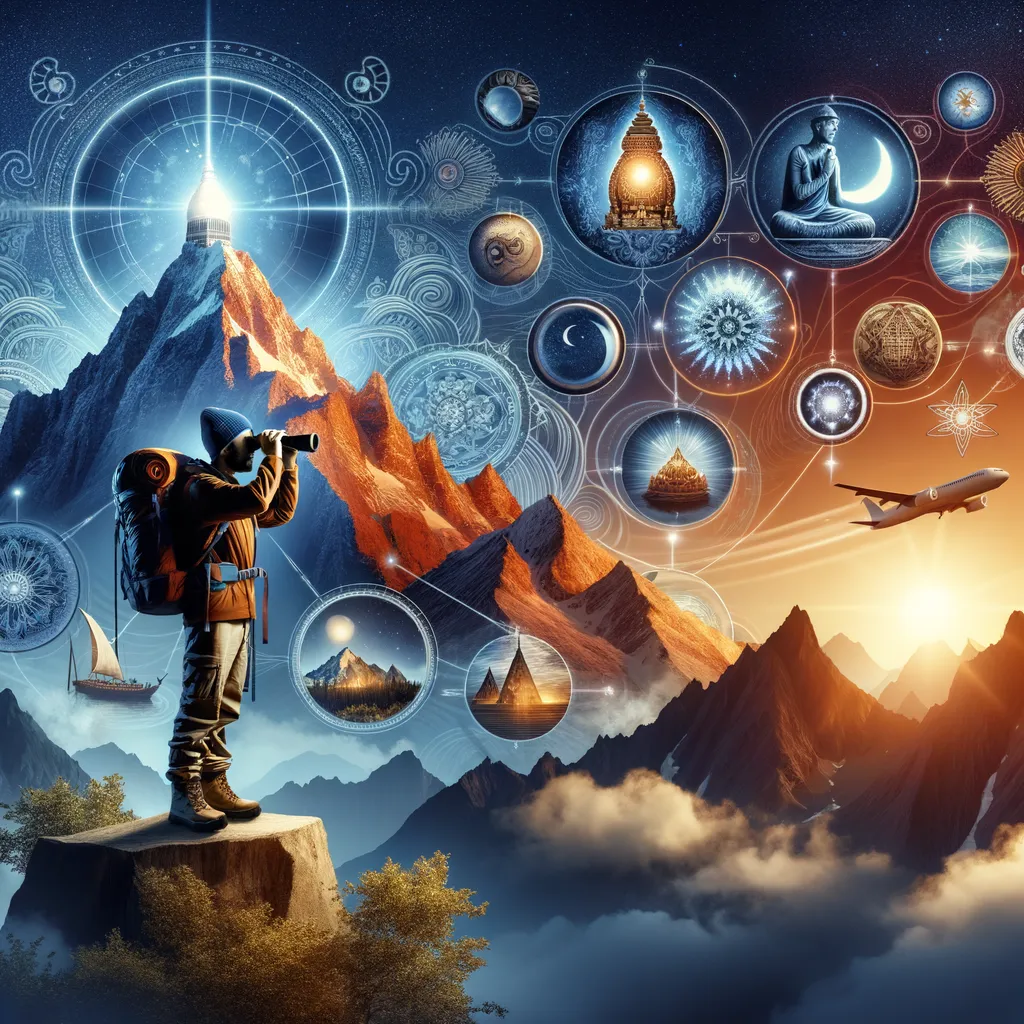Exploring the Sacred Highs: The Significance of Mountains in Global Faiths & Myths
Welcome, dear parents, to our immersive journey through the towering realms of spirituality and mythology! As guardians of the next generation, it’s a joy to bring forth tools and stories that can enrich your family’s understanding of the world’s diverse cultures and histories. Today, we delve into a fascinating chapter of our shared human legacy – The Role of Mountains in World Religions and Mythologies. Whether you’re planning an educational trip or simply seeking to inspire your children with tales of awe and wonder, mountains have much to teach us.
Before we embark on this enlightening expedition, don’t forget to gear up for your next outdoor adventure at Outdoors and discover the perfect family retreats and sacred spaces near you with Find camping spots. Now, let’s ascend into the mystique and majesty of mountains across cultures.
Mountains: The Axis Mundi of Ancient Beliefs
For millennia, mountains have stood as symbols of power, spirituality, and the divine. Their imposing presence and the challenge they present to climbers have made them subjects of veneration and spiritual quests in multiple cultures around the world. From the snow-capped peaks of the Himalayas in Asia to the rugged summits of the Andes in South America, mountains have been seen as the abode of gods, the pillars holding up the sky, and as central axes around which the world rotates (Axis Mundi).
In many religious traditions, mountains are considered sacred places where the heavens and the earth meet. They are sites of pilgrimage, meditation, and revelation. They have been the backdrop for transformative spiritual experiences and groundbreaking philosophical insights. It’s no wonder that these majestic features of our landscape have made their way deeply into the world’s religions and mythologies.
Mountains in Mythology: Cradles of Creation and Conflict
The mythologies of various cultures are rich with stories of mountains as places of origin, conflict, and communion with the divine. According to Greek mythology, Mount Olympus was the home of the Olympian gods, a place of unimaginable beauty and peace, exempt from the woes that plagued mere mortals. In Norse mythology, the sacred tree Yggdrasil connected the nine worlds, with its roots and branches spreading into the heavens, earth, and underworld, illustrating the interconnectedness of all things and the central role of the cosmic mountain.
Meanwhile, in Hinduism, mountains hold a special place as well. The great mountain Meru is considered to be the axis of the universe, connecting the heavens and the earth, serving as a symbolic link between the physical and the spiritual worlds. Similarly, Mount Kailash is revered in both Hinduism and Buddhism as the abode of Lord Shiva and a pivotal axis mundi, drawing thousands of pilgrims each year despite the harsh conditions.

Unlocking the Mysteries of Mountains in World Religions and Mythologies: A Guide for Parents
Welcome, wonderful parents, to a captivating exploration that promises to elevate your family’s curiosity and appreciation of the cultural and historical significance mountains carry in various world religions and mythologies. As you venture forth into teaching and learning alongside your children, this guide is your beacon through the majestic narrative that mountains hold in human civilization. Understanding these monumental natural wonders can enrich your family’s worldview and inspire a profound respect for our planet’s diverse cultures and religions.
Why Mountains Resonate with the Divine Across Cultures
Mountains, reaching towards the heavens, have universally been revered as homes of the gods, centers of the earth, and crucial landmarks in the spiritual landscapes of myriad cultures. Their daunting height and the mystery that shrouds their peaks have served not only as a physical challenge but also as a spiritual quest for many. For instance, the ethereal allure of Mount Fuji in Japan has long been a symbol of beauty and immortality, deeply entrenched in Shinto and Buddhist traditions. These sacred places offer a unique lens through which to view the beliefs and practices that have shaped human history.
Five Key Insights for Parents: Preparing Your Family for Cultural and Historical Journeys
As you guide your family through the intricate tapestry of stories and beliefs tied to these celestial summits, here are five essential insights to empower your journey:
- Embrace Local Practices: When visiting sacred mountains or engaging with stories about them, show respect for local customs and traditions. This could be as simple as observing silence, participating in rituals (where appropriate), or wearing suitable attire. It’s a wonderful opportunity for your children to learn about and appreciate cultural diversity first-hand.
- Explore Through Multifaceted Lenses: Approach your exploration of mountains in world religions and mythologies through various lenses – geographical, spiritual, historical, and ecological. This multidimensional perspective can help children appreciate the interconnectedness of nature and culture, fostering a deeper understanding and respect for both.
- Incorporate Multisensory Learning: Enhance the learning experience by incorporating elements that appeal to all senses. Listening to traditional music, tasting foods that are part of pilgrimages, and handling materials like rocks or plants native to these sacred mountains can make the learning journey vibrant and memorable.
- Encourage Reflective Engagement: Encourage your children to reflect on and share their thoughts and feelings about what they learn. This can be facilitated through art projects, storytelling, or journaling, providing a personal space for children to express their insights and emotions related to their discoveries.
- Leverage Technology Responsibly: Use technology to explore remote mountains and their spiritual significance without leaving your home. Virtual tours, documentaries, and educational apps can provide rich, immersive experiences. However, ensure a balanced approach to screen time, supplementing digital exploration with real-world experiences and conversations.
Initiating this journey with your children not only broadens their horizons but also plants seeds of curiosity, respect, and understanding that can flourish throughout their lives. Mountains, with their awe-inspiring majesty and sacred mystery, remind us of the profound connections between the physical and the spiritual, the earth and the sky, the human and the divine.
Creating Lasting Impressions and Teachable Moments
Engaging with mountains in the context of world religions and mythologies offers endless opportunities for education and inspiration. Each mountain holds a story, each tradition a lesson, and every pilgrimage a testimony to the human spirit’s quest for meaning and connection. As you and your family traverse these stories and landscapes, either virtually or in reality, remember that the journey itself can be as transformative as the destination.
In this digital age, where information is readily accessible, the challenge lies in fostering a genuine connection and understanding. By emphasizing empathy, respect, and open-mindedness, you are setting a powerful example for your children on how to engage with the world’s vast complexities and wonders. Let the stories of mountains in world religions and mythologies be a gateway to a lifetime of exploration, learning, and appreciation for the myriad ways humans find meaning in the natural world.
Delving into the historical and cultural perspectives of mountains enriches our lives with layers of meaning that transcend our daily experiences, offering insights into the human condition and our place within the natural order. So, dear parents, as you embark on these explorations with your children, cherish each moment of wonder and discovery, for these are the experiences that shape our understanding of the world and our connections with each other.
Disclaimer
The articles available via our website provide general information only and we strongly urge readers to exercise caution and conduct their own thorough research and fact-checking. The information presented should not be taken as absolute truth, and, to the maximum extent permitted by law, we will not be held liable for any inaccuracies or errors in the content. It is essential for individuals to independently verify and validate the information before making any decisions or taking any actions based on the articles.




